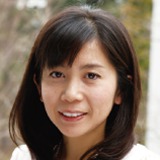
Wishing to contribute to society
through numerical computations
with verified precision
Q. What made you specialize in applied mathematics?
I worked as a systems engineer in a major IT firm for five years after I graduated from university. Simply put, the job required a wide range of knowledge and project management ability. I learned a lot from working in society, and it was a valuable experience. Yet, I could no longer dream of my future in the career as a systems engineer. I have always liked mathematics since I was a child and wanted to select a career related to mathematics. So I decided to enroll in a graduate program to relearn mathematics, which was my original interest, and find a career that I truly wanted. I first enrolled in a master’s program at Tokyo Woman’s Christian University where I had completed my undergraduate program. I then moved on to the doctorate program in applied mathematics at Waseda University. Waseda University is willing to accept graduates from other universities and respects what they want to do. The flexible atmosphere is unique to Waseda University.
Persistence is required for research.
Q. Describe your research.
My research theme is verified numerical computations. It is a method of quantitative computation to see the error from the outcome of numerical computations by computer compared to an exact solution. I suppose many people think that the outcome of computations by a computer is correct. Yet, this is not necessarily true, and the computations sometimes have errors. I was shocked when I learned this. I also learned that the outcomes of numerical computations could be applied to various aspects of society if verified numerical computations showed to which digit the computation outcome was correct or whether there was a solution to a problem. My current interest and focus are linear problems with unfavorable conditions. Solving linear problems using a computer causes errors because the outcome of the computation remains within the number of finite digits. In addition, linear problems with unfavorable conditions are difficult to solve. Sometimes the outcome of the numerical computation differs in every digit from an exact solution. I am exploring ways to quickly solve such problems and obtain high precision outcomes of numerical computations. This is a painstaking process of analyzing errors in individual computations in detail and repeating numerical experiments over and over. Sometimes I become tired and depressed in the process, but the pleasure of completing every process makes me forget all the pain I went through. This feeling makes me want to work on more difficult problems. This is the time when I become aware that I truly love this research. Yet, people think that this method requires a large number of computations and takes time. Experts who handle supercomputers tend to avoid these problems. I think its benefits are not well understood. This is why I would like to continue my research so that many people will know about it. Then I would like to contribute to society through my research.